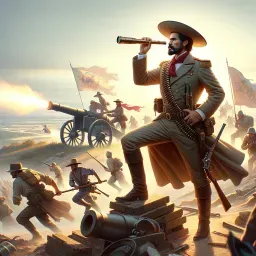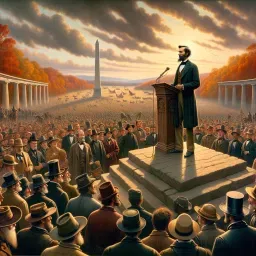”The goal to strive for is a poor
government but a rich people“

- Meaning
- This phrase suggests that an ideal state is one where the government maintains modest wealth and power, while the citizens are prosperous. It implies that the primary objective of the government should be to enhance the well-being and economic prosperity of its people, rather than amassing wealth for itself. This idea encourages the minimization of government intervention in economic activities, thereby allowing private enterprise and individual innovation to flourish.
- Allegory
- The humble government building symbolizes the minimal wealth and power of the government. Surrounding it, the vibrant market full of busy, prosperous people represents a rich populace engaged in various economic activities, reflecting individual freedom and prosperity. The colorful stalls and goods signify the creativity and innovation that flourish in such environments. The well-maintained roads and lush landscapes in the background indicate community benefits from the thriving economy, portraying a balanced, harmonious relationship between a modest government and the prosperous people it supports.
- Applicability
- This concept can be applied to personal life and societal governance by advocating for policies that promote individual economic freedom and entrepreneurship. Encouraging a government that focuses on creating an environment where businesses and individuals can thrive may lead to greater overall prosperity. It also supports the idea that a flourishing populace is a better indicator of a country's success than the size of its government's coffers.
- Impact
- This phrase has had a substantial impact on economic policies and theories, particularly those advocating for laissez-faire economics and minimal government intervention. It has also been a guiding principle for many free-market advocates and libertarians, serving as a foundation for arguments against extensive government control and for personal economic freedom.
- Historical Context
- The historical context of this phrase originates from the early 19th century during the Industrial Revolution and the Enlightenment period. This was a time of significant economic and social change, where ideas about free markets and limited government were being vigorously discussed and developed.
- Criticisms
- Criticisms of this phrase come from those who believe a certain level of government intervention is necessary to ensure equitable distribution of resources and protect vulnerable populations. Critics argue that without government wealth, there might not be enough public services, infrastructure, or social safety nets, leading to greater inequality and social unrest.
- Variations
- Variations of this phrase can be found in different cultural contexts, each emphasizing the importance of limiting government wealth and emphasizing the prosperity of the populace. Different interpretations may highlight the balance between government provision of necessary services and overall economic freedom.
-

The art of war is simple enough. Find out where your enemy is. Get at him as soon as you can. Strike him as hard as you can, and keep moving on.
-

Fourscore and seven years ago our fathers brought forth on this continent, a new nation, conceived in Liberty, and dedicated to the proposition that all men are created equal.
-

That government is best which governs least.
-

I contend that the strongest of all governments is that which is most free.
-

He serves his party best who serves the country best.
-

What is right and what is practicable are two different things.
-

The truth shall set you free.
-

We are our choices.
-

Citius, altius, fortius.
-

There is no other life; why don’t you give your whole heart to this one?
-

It is a damn poor mind indeed which can't think of at least two ways to spell any word.
No Comments